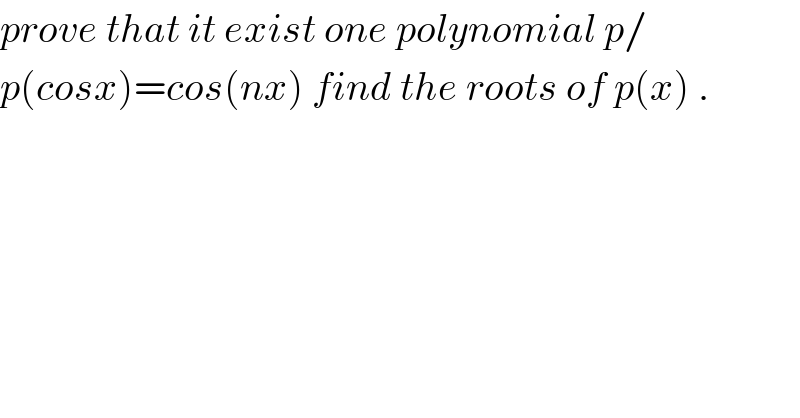
Question and Answers Forum
Question Number 30598 by abdo imad last updated on 23/Feb/18

Commented by abdo imad last updated on 27/Feb/18
![we have by moivre formula cos(nx) +isin(nx)=(cosx +isinx)^n = Σ_(k=0) ^n C_n ^k (isinx)^k (cosx)^(n−k) = Σ_(p=0) ^([(n/2)]) C_n ^(2p) (isinx)^(2p) (cosx)^(n−2p) +Σ_(p=0) ^([((n−1)/2)]) = C_n ^(2p+1) (isinx)^(2p+1) (cosx)^(n−2p−1) cos(nx)=Re(e^(inx) )= Σ_(p=0) ^([(n/2)]) (−1)^p C_n ^(2p) (1−cos^2 x)^p (cosx)^(n−2p) =p(cosx) /p(x)= Σ_(p=0) ^([(n/2)]) (−1)^p C_n ^(2p) (1−x^2 )^p x^(n−2p) . 2) X root of p (x)⇔ p(X)=0 let put X=cosθ p(X)=0 ⇔p(cosθ)=0 ⇔cos(nθ)=0 ⇔ nθ= (π/2) +kπ ⇔ θ=(π/(2n)) +((kπ)/n)=(((2k+1)π)/(2n)) but wecan chow that deg p=n ⇒ the roits of p(x) are X_k = cos(θ_k ) =cos((2k+1)(π/(2n))) with k∈[[0,n−1]].](Q30848.png)
| ||
Question and Answers Forum | ||
Question Number 30598 by abdo imad last updated on 23/Feb/18 | ||
 | ||
Commented by abdo imad last updated on 27/Feb/18 | ||
![we have by moivre formula cos(nx) +isin(nx)=(cosx +isinx)^n = Σ_(k=0) ^n C_n ^k (isinx)^k (cosx)^(n−k) = Σ_(p=0) ^([(n/2)]) C_n ^(2p) (isinx)^(2p) (cosx)^(n−2p) +Σ_(p=0) ^([((n−1)/2)]) = C_n ^(2p+1) (isinx)^(2p+1) (cosx)^(n−2p−1) cos(nx)=Re(e^(inx) )= Σ_(p=0) ^([(n/2)]) (−1)^p C_n ^(2p) (1−cos^2 x)^p (cosx)^(n−2p) =p(cosx) /p(x)= Σ_(p=0) ^([(n/2)]) (−1)^p C_n ^(2p) (1−x^2 )^p x^(n−2p) . 2) X root of p (x)⇔ p(X)=0 let put X=cosθ p(X)=0 ⇔p(cosθ)=0 ⇔cos(nθ)=0 ⇔ nθ= (π/2) +kπ ⇔ θ=(π/(2n)) +((kπ)/n)=(((2k+1)π)/(2n)) but wecan chow that deg p=n ⇒ the roits of p(x) are X_k = cos(θ_k ) =cos((2k+1)(π/(2n))) with k∈[[0,n−1]].](Q30848.png) | ||